Try It
A Postwar Vision in Fourteen Points
Watch A Postwar Vision in Fourteen Points (3:01)to examine the national and global context that motivated President Woodrow Wilson to write the Fourteen Points, his vision for attaining peace after World War I. PBS login information.
Wilson's Vision for Peace
President Woodrow Wilson formulated a global plan for peace following World War I called the Fourteen Points.
- The first five points aimed to prevent another war from occurring.
- The next eight points established country boundary changes based on self-determination.
- The fourteenth point called for a League of Nations.
Read Wilson's Address to the Joint Session of Congress on the Conditions of Peace to view the Fourteen Points.
League of Nations
The League of Nations was Wilson's main goal of his peace plan. It was to be an international organization to address diplomatic crises. He thought having such an organization would prevent another war from occurring.
President Wilson went into peace negotiations with an optimistic and idealistic attitude. He did not consider that the other nations would not be as idealistic and forgiving. Our allies in Europe had suffered much greater loses in the war.
Ultimately, Wilson would concede most of his Fourteen Points in order for the League of Nations to be established.
Paris Peace Conference
The goal of the Paris Peace Conference was to determine the final terms of the Peace Treaty.
The conference participants included Great Britain, France, Italy, and the United States. The Central Powers and Russia were not invited to attend the Conference.
Read US History: The Treaty of Versailles and the League of Nations to learn more about the Treaty of Versailles and the Paris Peace Conference.
“The Big Four”
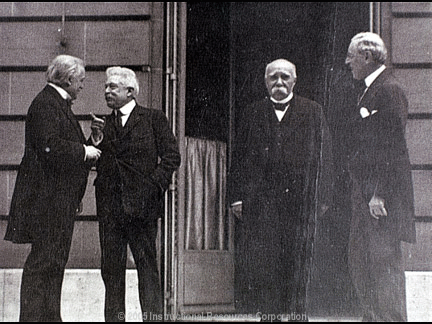
Decision Making
Each of the "big four" representatives had a specific agenda:
- France was determined to prevent any future invasions by the Germans.
- Great Britain felt Germany must pay for the War.
- Italy wanted control of the Austrian-held territory.
- President Wilson wanted a League of Nations.
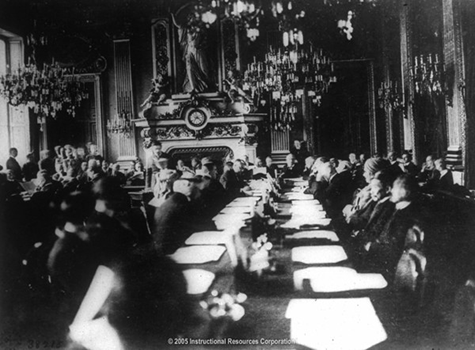
Treaty of Versailles Signed on June 28, 1919
The end result of the conference was the Treaty of Versailles.
The Treaty of Versailles included the following terms:
- Established nine new nations
- Barred Germany from maintaining an army, navy, and air force
- Returned Alsace-Lorraine (territory that was taken by the German Empire in 1871) to France
- Required Germany to pay war reparations, or compensation for damages, amounting to $33 billion to the Allies
- Required Germany to sign a war-guilt clause admitting sole responsibility for the war
Countries Created by World War I
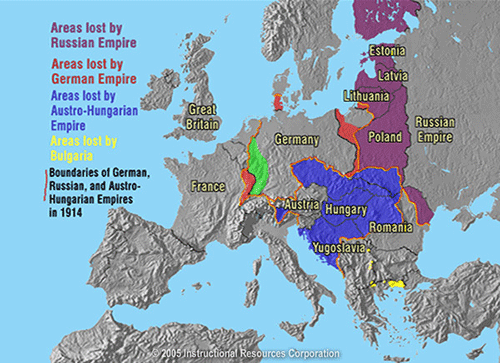
- Established nine new nations
- Finland
- Latvia
- Estonia
- Poland
- Lithuania
- Yugoslavia
- Czechoslovakia
- Austria-Hungary was divided into two countries.
Wilson Seeks Approval of Treaty
When President Wilson returned home from Paris, he was greeted with mixed public reaction to the Treaty of Versailles. He was met with opposition because some Americans felt the treaty was too harsh.
There was also opposition over joining the League of Nations. Many felt it would weaken American independence and possibly draw the U.S. into another foreign war.
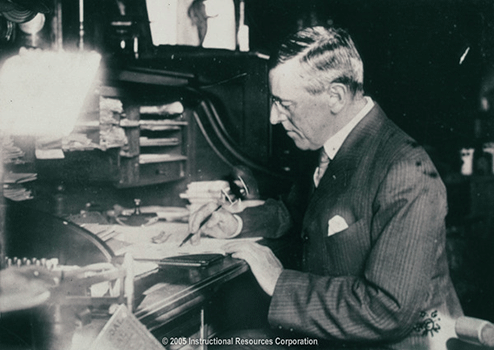
The Senate and the Treaty
Wilson refused to compromise on the League of Nations and continued to fight for it to pass.
The Senate, led by irreconcilables (a group of Senators, mostly Republicans, who opposed Wilson, the Treaty, and the League of Nations), voted to reject the treaty because it did not want the U.S. to be a part of the League of Nations.
Wilson tours the United States
Wilson toured the country to win support for the League of Nations, but he suffered a stroke on October 2, 1919 and was paralyzed.
Despite Wilson's nationwide campaign for the Treaty of Versailles, it was defeated and the U.S. never joined the League of Nations. A separate treaty with Germany was signed in 1921.
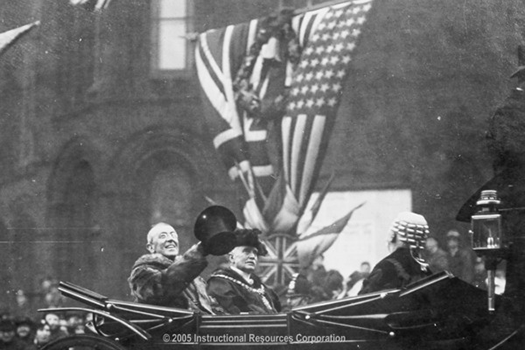
Woodrow Wilson's Last Days
The goal of the Woodrow Wilson attempted to secure changes in the world and the United States with varying degrees of success.
Postwar Adjustments
Overall, the war had been a boost for the U.S. economy, but there were other adjustments to make at home:
- Established nine new nations
- Servicemen returning home had trouble finding jobs.
- Women who were working in factories chose to work at home or were fired to make jobs for the returning soliders.
- Discrimination was still a widespread problem. Even African American soldiers who had served in our military faced discrimination when they returned home from the war.
The Effects of World War I
After the United States entered the war, Germany was defeated, and the war ended. Millions had been killed, and there were aftershocks around the world. Nonviolence was encouraged. Because of the work of the women during the war in both Great Britain and the United States, they gained voting rights. After the war, many dealt with despair and pessimism.
Legacy of Versailles?
Read the quote below taken from a German newspaper in 1919, after peace talks. What is this quote foreshadowing?
"Today in the Hall of Mirrors, the disgraceful Treaty is being signed. Do not forget it. The German people will with unceasing labour press forward to reconquer the place among nations to which it is entitled. Then will come vengeance for the shame of 1919."
Germany and the Treaty
The effects of World War I would be felt over the next couple of decades. The animosity created during the war and the bitterness of peace negotiations would contribute to World War II just 21 years later.